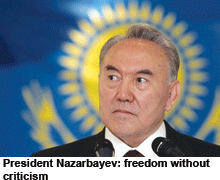Kazakhstan has more higher education institutions than the UK, is seven times the size of Germany in terms of land mass, but has a population smaller than the Netherlands. Factor in the legacy of a Soviet degree system and trilingual teaching in Kazakh, Russian and English, and it sounds like a recipe for an unwieldy academic sector. Yet Kazakhstan (pop. 16.5 million) is embracing the European degree system, attempting to attract international scholars and trying to repair its rusting science base.
But what are the prospects for scholarly progress in a nation where, according to one non-governmental organisation, academics are prevented from criticising the president and corruption in the education system is “widespread”?
Five years ago, a team from the World Bank discerned many strong points in Kazakhstan’s academy. The sector showed impressive “size and diversity” and there was “strong demand” for higher education, as well as high student literacy and language skills, according to the World Bank’s report, Higher Education in Kazakhstan. But public spending was low, excessive contact hours were “damaging” the quality of teaching and learning, and the sector’s science and technology base was “wasting”, according to the report.
As a former republic of the USSR, Kazakhstan inherited the Soviet “linear” system of degrees, explains Aidar Abrayev, head of the informational-analytical department, which advises the country’s ministry of education and science on policy. Students were required to take five-year “specialist” degrees, equivalent to combined bachelor’s and Masters qualifications, although “with higher secondary education, you could go straight into the third year of the specialist (degree)”, says Abrayev. This system put the country out of step with most of the world.
In March 2010, Kazakhstan followed other ex-Soviet states including Russia and Georgia by signing up for the Bologna Process initiated by the European Commission, in which university education is separated into bachelor’s, Masters and doctoral levels. However, Abrayev acknowledges, not all of Kazakhstan’s higher education institutions have yet adapted to Bologna’s requirements.
 Universities are also being pushed to teach in English in order to bring Kazakhstan within the orbit of the international academic community. For example, the L.N. Gumilyov Eurasian National University, based in the capital Astana, is in the process of converting most of its programmes to English from a mixture of Russian and Kazakh. The government has also established a new legally autonomous institution in the capital, Nazarbayev University, where all academic work is conducted in English and most faculty are drawn from outside the country.
Universities are also being pushed to teach in English in order to bring Kazakhstan within the orbit of the international academic community. For example, the L.N. Gumilyov Eurasian National University, based in the capital Astana, is in the process of converting most of its programmes to English from a mixture of Russian and Kazakh. The government has also established a new legally autonomous institution in the capital, Nazarbayev University, where all academic work is conducted in English and most faculty are drawn from outside the country.
University College London runs a year-long course at Nazarbayev which leads to a “university preparatory certificate”. Students then go on to undergraduate studies. The University of Pennsylvania was consulted on the structure and governance of Nazarbayev before it was set up, and several other Western institutions have been involved. Foreign scholars are being brought in as another initiative to internationalise the Kazakh sector. Last year, the government invited 1,100 overseas university teachers and scientists to give lectures at 27 of the nation’s universities.
A wave of private universities set up after Kazakhstan became independent in 1991, are less encumbered by the legacy of the Soviet degree structure. But their proliferation since independence has created another problem: diploma mills. In 2000, there were 123 private higher education institutions in Kazakhstan, although the introduction of new government quality standards have forced some of them to close or merge, reducing the number to 92. However, diploma mills still exist “because of the high status given to diploma holders”.
But for all Kazakhstan’s Western pretensions, doubts remain about academic autonomy and freedom in a repressive state. The country is ranked as “not free” by Freedom House, an NGO that says that journalists face “attacks, arrests and libel judgements”. “The government reportedly permits academic freedom, except with respect to criticism of the president and his family. Corruption in the education system is widespread, and students frequently bribe professors for passing grades,” Freedom House reports.
Nazarbayev University, touted as a model for a new type of free and independent institution, is named after Nursultan Nazarbayev. Prime minister of the Kazakh Soviet Socialist Republic between 1984-1989, he has held the office of president of Kazakhstan since the country’s independence.
In last year’s election, he sealed another term in power with a reported 95.5 percent of the vote in a poll that featured an “absence of opposition candidates and of a vibrant political discourse”, according to the Organisation for Security and Cooperation in Europe.
(Excerpted and adapted from Times Higher Education)